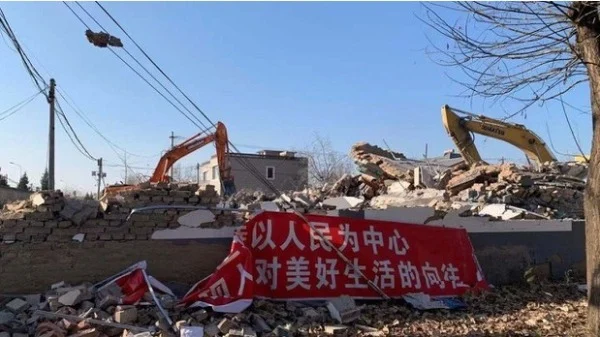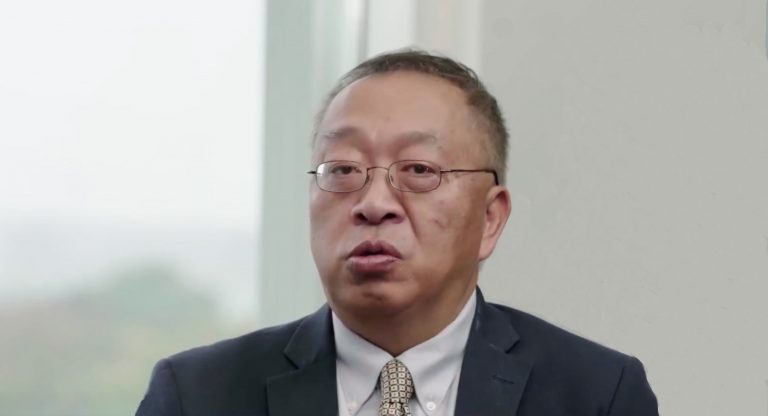In the middle of November, 2,000, residents living in the Jiuhua Agricultural Science Demonstration Park in the northwestern outskirts of the Chinese capital were given sudden notice that their homes would be subject to compulsory demolition, known as chaiqian in Mandarin.
The action began on Nov. 17, when 200 men donning black security uniforms stormed into the suburban area and pasted written notices of the impending demolition throughout the community. The directive had come from Wang Hongmin, the Communist Party secretary of Xiaotangshan Town, Changping District, where the development is located.
An excavator was also deployed to destroy Jiuhua’s natural gas infrastructure, cutting off the residents from heating for the winter.
Watch footage from the scene below:
Residents called 110, the equivalent of 911 in China, but were told that the directive was a government action, supposedly issued in accordance with the Beijing Urban and Rural Planning Regulations. Attempts to get the local government to intervene only resulted in bureaucratic impasses. According to the authorities, the intruders were acting “as individuals.”
Success
You are now signed up for our newsletter
Success
Check your email to complete sign up
As of Dec. 1, the uniformed men continue to occupy the neighborhood.
Property of the state
In China, all land belongs to the state, and is typically leased to developers for decades at a time. What individuals and firms own are the buildings on the land itself.
A homeowner in the area described the administrative vagaries filling the notice posted by the intruders, noting language such as “refusal to cooperate with the removal of remediation responsibilities” or — citing Article 68 of the aforementioned Regulations — the “administrative penalties and administrative penalties“ to which the “law enforcement authorities” should “subject illegal construction parties.”
Those who resist the directions — the so-called “illegal construction parties”— will take a hit to their social credit score, the homeowner said, referring to the system of merits and demerits that the Chinese Communist Party (CCP) introduced mid-last decade. The resident also noted the “disciplinary measures” threatened in the notice.
Beijing has launched numerous demolition drives around its suburban areas for further economic expansion outside its congested urban core this year. These projects appear to largely target and directly affect the poorer residents who lack the ability to maintain pace with the housing market in the 22-million-strong megacity.

However, the Jiuhua homeowners have asserted that the demolition-in-progress is unlawful, as the developers had obtained a lease to the land issued by the Changping district government, valid between 1999 and 2049.
Right after the first notice delivered to the property owners on Nov. 17, a group of security guards from local authorities bypassed the owners and cut off their gas pipes, water, and electricity supply, all of which had been installed at their own expense. Homeowner Mr. Zhang mentioned to an Epoch Times reporter that “about 500 people arrived at the scene and chaos broke out. We set up a roadblock to prevent them [the men sent by the local government] from coming in, but we couldn’t stop them.”
On Nov. 23, the local government issued the second notice emphasizing that if the residents do not comply with the order, the Beijing municipal authorities would step in.
Unable to cook or bathe with hot water, the residents of Jiuhua face a steep battle, as winter is quickly approaching.
The Party gives, the Party takes
In something of a paradox, it was the local government that had encouraged many of the residents to move to Jihua in the 1990s and 2000s, when the development was new. But the same authorities now accuse the homeowners of violating the regulations on “small property rights.”
Zhang believes the government is illegally rescinding their rights to the land and tearing up the 50-year-lease in a bid to resell the land to developers for a higher value.
Many Chinese provincial and local governments hold large quantities of “implicit” debt — functionally equivalent to bad debt — and are severely strapped for cash and sources of revenue.
On the political side, due to the lack of functioning legal oversights, what is recognized by the government one year may no longer be considered legitimate the next. Especially for those without personal relationships to powerful officials, the Communist Party can divest them of their property and livelihood for virtually any excuse.
In the Jiuhua Agricultural Park case, the roots of economic resentment run deep, and have been resurrected by the CCP for its benefit.
Zhang told The Epoch Times that the local government has put pressure on him and his neighbors by inciting the local peasant dwellers to sue the Jiuhua residents, promising them benefits in exchange.
However, the source of the farmers’ discontent lies in the government’s past actions that led to the agricultural park’s existence in the first place. At the time, the authorities had forced the farmers off the land, providing them low compensation in order to make a large profit selling the property to developers, who, in turn, undertook the construction of Jiuhua.
Follow us on Twitter or subscribe to our email list













